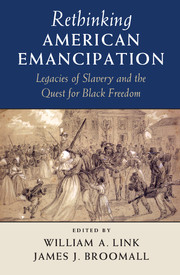Introduction
Published online by Cambridge University Press: 05 November 2015
Summary
It is American iconography. On January 1, 1863, Abraham Lincoln issued the Emancipation Proclamation, a bold presidential war measure indicating a dramatic shift in the rationale for fighting the Civil War and a promise of future freedom for 4 million enslaved Americans. Yet the document marked just a beginning. Only after the spring of 1865, when the North's military victory toppled the South's powerful slaveholding class, were the enslaved guaranteed liberation. Freedom's future was far from certain, however. Long after January 1863, the significance of both the Proclamation and emancipation assumed new meanings. During the ensuing generations, African Americans explored freedom, even while the nation hoped to rebuild itself and the government attempted to reconstruct the South. Events would ultimately demonstrate that, despite the sweeping power of Lincoln's Proclamation, the struggle over freedom and the problem of coercion defined emancipation's wider legacy. Ultimately, as historian Laura F. Edwards observes in her Epilogue to this volume, freedom's journey “was a long one, because slavery's influence was so pervasive.”
Rethinking American Emancipation: Legacies of Slavery and the Quest for Black Freedom contains nine essays that reconsider the origins, impact, and meaning of the end of slavery. It relies on several generations of rich scholarship about emancipation that has documented how the Civil War became a violent struggle to end the world's largest and most powerful system of slavery. The destruction of slavery has become a central element in our understanding of how the cataclysmic Civil War helped to remake American society. During the war years, both Abraham Lincoln and Frederick Douglass framed slavery's death as the catalyst for a national “rebirth.” “This revolutionary – regenerative – conception of the war,” writes historian David Blight, “launched black freedom and future equality on its marvelous, but always endangered, career in American history and memory.”
Collectively, the essays in this volume constitute a complex portrait of emancipation and its aftermath, thereby demonstrating new ways of considering the sources of slavery's demise. Was emancipation accomplished by political and military policies from above, or by self-emancipation from below? How important were slaves’ actions versus those of Congress, the president, and military authorities? Even after slavery formally ended in 1865 with the Thirteenth Amendment, freedom's boundaries remained fluid and contested.
- Type
- Chapter
- Information
- Rethinking American EmancipationLegacies of Slavery and the Quest for Black Freedom, pp. 1 - 12Publisher: Cambridge University PressPrint publication year: 2015

